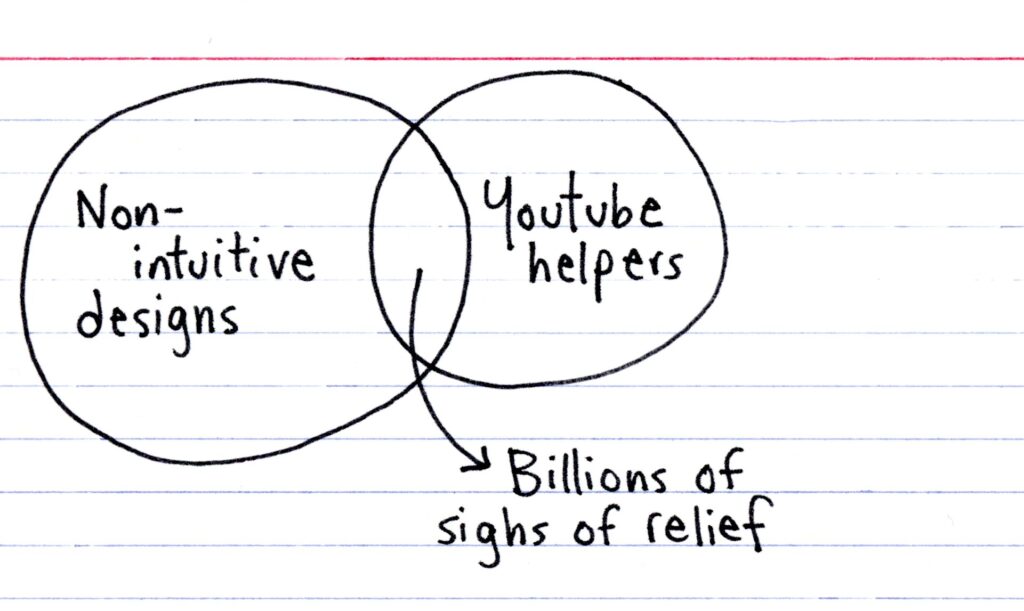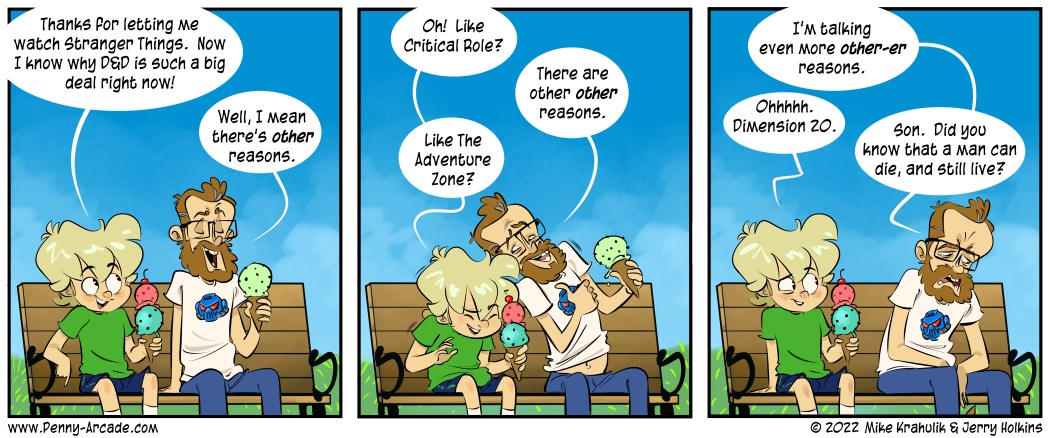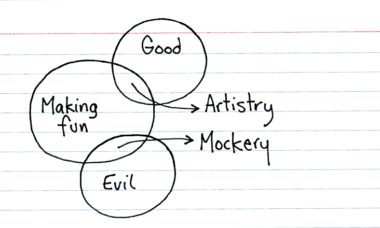 Explore our collection to find out more about Gemini, the most capable and general model we’ve ever built.
Explore our collection to find out more about Gemini, the most capable and general model we’ve ever built.
Shared posts
Learn more about Gemini, our most capable AI model
 Explore our collection to find out more about Gemini, the most capable and general model we’ve ever built.
Explore our collection to find out more about Gemini, the most capable and general model we’ve ever built.
Troubles shot dead.

The post Troubles shot dead. appeared first on Indexed.
Hérissons Sans Frontières
Man, it's a bumper crop out there for contrarian jag-wads like myself - those who are determined to find the secret and hidden virtue in the lukewarm. First it was Gotham Knights, which is much better than I had read in most places. Does it occasionally, you know "forget to run" on PC? Yeah! What about after it's running- does it stop sometimes, as though to prove some kind of point about how life is fleeting or some shit? For sure. Do I still try to play it every day? I mean… yeah. It has a ton of heart, whatever failings it might have in terms of somewhat repetitive combat and occasional, I mean, you know. Not… running-ness.
Sonic Frontiers was identified early on as a game to make fun of. It's very safe to do so, and being especially harsh gives the impression that we are dealing with someone with meaningful opinions and authentic heft. They aren't gonna run this kind of calibration on a Naughty Dog game, because they want to work there. But with a game like Sonic Frontiers, the scion of a troubled dynasty, you can burnish your proletarian bonafides essentially for free.
It is much, much better than anybody is gonna give it credit for. I keep talking about my affection for the Hard Seven, the work that occasionally has difficulty enunciating its own virtues, or had a difficult birth, or simply emerged into the world in something less than golden, angelic light. Because we've been, I think, irrevocably mindfucked by the ratcheting of the Algorithmic State, a kind of omnipresent floodgate designed to sort data, money, and human beings between irredeemable Zeroes and virtuous Ones, we aren't really interested in or capable of parsing ambiguity as a concept.
Well, ambiguity is all I'm interested in. Ambiguity is how we find the next thing. I know what's going to happen if I buy God of War; I'd rather spend that time, and that money, taking chances.
(CW)TB out.
.NET 6 is now in Ubuntu 22.04 https://bit.ly/3zYsYXZ (https://bit.ly/3A3D2Po)
.NET 6 is now in Ubuntu 22.04 bit.ly/3zYsYXZ (bit.ly/3A3D2Po)
Solar-powered system offers a route to inexpensive desalination https://bit.ly/36JT0mR (https://bit.ly/3MbhXIo)
Solar-powered system offers a route to inexpensive desalination bit.ly/36JT0mR (bit.ly/3MbhXIo)
How to Walk From a Deal
Like it or not, once in a while it’s appropriate for a vendor to walk away from a prospective deal. Why might you want to do that?
- You think your product is a poor fit with the customer’s needs.
- You believe there is insufficient budget to achieve success on the project.
- You feel like the deal is wired for another vendor, i.e., you think you are column fodder in the evaluation process.
- You (and all your fellow reps) are fully booked with other more qualified opportunities.
One day I should probably write a post on how to make the critical stay vs. walk decision. But today, I want to focus on something downstream of that — I want to focus on how to successfully walk from a deal once you’ve decided that it’s necessary to do so.
A good walk-away process should pass three tests in the mind of the customer.
- The customer should feel like they were treated respectfully.
- In the future, the customer should remain interested in buying from both you individually and your company, should circumstances be different. (Ideally, they will be more interested in buying from you because you walked.)
- The customer should feel like the decision was not unilateral.
Given these three tests, here a few ways NOT to walk away from an opportunity.
- Calling five minutes before a meeting to say you’re too busy to work on the opportunity because you don’t think it’s qualified anyway.
- Leaving a voicemail in the middle of the night saying that you’ve decided to stop pursuing the opportunity.
- Telling the customer their problem is too simple and/or their people are not sufficiently sophisticated to use your software.
- Emailing to say that they are running a rigged process in which you can no longer, in good conscience, compete.
And there are lots more. In short, there are a lot of WRONG ways to walk from an opportunity. The right way involves doing the following things:
- Bring it up quickly. Once you realize there’s good reason to walk, you immediately get in touch with the customer.
- Get the key contact on the phone and saying you’re considering dropping out and would welcome the chance to explain why.
- Have a meeting or call to discuss the reasons you believe you should no longer participate in the sales cycle.
- Ask for their feedback on those reasons.
- Unless you hear otherwise in their feedback, thank them for their time.
- Check back in later (e.g., in a few months) to ask how things turned out.
Amazingly, a lot of salespeople are afraid to walk away correctly. So they procrastinate and then, suddenly, at the 11th hour, burst out saying “we’re not coming.” This leaves a terrible impression on the customer and denies them the chance to correct potential misunderstandings in the logic that led to the walk-away decision.
My company has won deals by walking away in the right fashion. To be clear, I am not advocating bluffing; when you say you’re walking you need to be prepared to do so. But I have seen cases where the walk-away attempt revealed either a misunderstanding of the problem or the fact that no other vendor was willing to tell the customer what they didn’t want to hear.
I’ve seen cases where we get invited back six to eighteen months later and then win the deal.
I’ve also seen cases where the rep mangles the walk-away process, the customer goes ballistic and I, as CEO, need to jump in, eat a large piece of humble pie, figure out what’s going on, and assign a new rep to the deal. We’ve won a few of these as well.
A fair number of salespeople like to brag about walking from deals, yet relatively few are mindful in how they do it. Those who are mindful, and who follow the rules and steps above, will sell more in both the short- and long-term than those who are not.
Let me remind me

Truly learning a lesson is deeper than simply knowing the lesson. It’s possible to know a whole lot more than you’re capable of acting on with regularity. And it’s the act, not the mere knowing, that makes the difference.
When it comes to physical lessons, we instinctually know this. I know the steps it takes to do a kickflip ollie on a skateboard, but I still haven’t practiced nearly enough to pull it off. I wouldn’t expect to be able to do this without spending hours and hours of repetition.
But when it comes to mental lessons, it seems like most of us don’t respect the need to practice. I wrote about how this applies to learning something like programming to the level of mastery a few days ago. But it applies to life and business lessons as well.
Take the simple example of “I shouldn’t infer intention from action”. I know and believe this, but I still fail to practice it frequently.
Let’s say someone criticizes my work. I might infer that they’re just doing this to needle me needlessly because I criticized their work a few weeks back. That this really isn’t about the work, but it’s about retribution for an earlier skirmish.
That might be true. It is one of the possibilities. But it’s probably not that likely. It’s probably more likely that there’s simply a mistake in my work and the person spotted it. Unrelated to whatever discussion we had about their work weeks back.
But we humans love to jump to conclusions and validate our insecurities. That’s why we need lessons and coping mechanisms to do better. And that’s why it’s not just enough to know them, but to practice and be reminded all the time.
A strategy I’ve successfully used to remind myself in moments of need is to look for emotional smoke. If I’m getting upset about someone pointing out an error in my work, and it’s not because they’re being a dick about it, then that’s smoke. If you tune your emotional smoke detector to go off when your mood changes or your temperament flares, you give yourself a pause to contemplate which lesson you should be practicing.
The instinctual autopilot is great when the sky is blue and there’s no turbulence, but as soon as the clouds gather and the ride gets rocky, it’s time to grab the wheel with intent. So that’s what I try to do. Be mindful of emotional disturbances, hit pause when I spot them, and go through my current curriculum to find the lesson that clearly still needs attention.
The most important lessons are so because they’re hard. They’re the ones that take the most work to internalize, lest we forget in the moment and take action without their input. They are the ones we need to hear over and over again.
Pause yourself. Remind yourself. Repeat yourself.
Let me remind me was originally published in Signal v. Noise on Medium, where people are continuing the conversation by highlighting and responding to this story.
Read the responses to this story on Medium.







